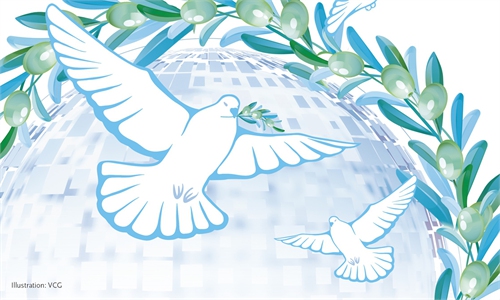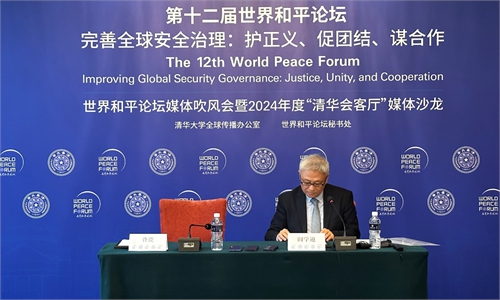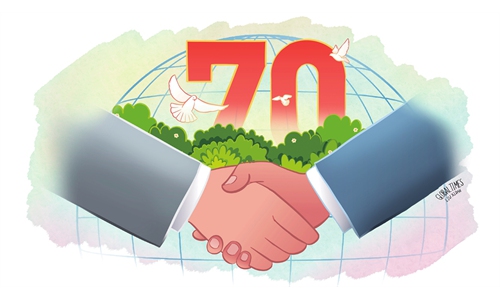Exchanges, mutual understanding of civilizations indispensable to solving global problems

Illustration: VCG
Today's world is experiencing a new period of turbulence and change, marked by a confluence of chaos and multiple crises. People are increasingly worried about the future of the world, and their intrinsic yearning for unity rather than division, and for cooperation rather than confrontation, is more intense than ever. It is alarming that the Cold War mentality persists, and that outdated theories like the "clash of civilizations" and "civilizational supremacy" have reemerged from time to time. The theory and practice of contemporary international relations have proven that the logic of the "clash of civilizations" not only fails to explain the root causes of international political and economic competition, but it also creates a "fast knot" in these already complex and contradictory relations.
Global civilizations in 'plural form' are viewed by some as 'singular'
The various civilizations created by human society are like a hundred gardens, each with its own differences and colors. It can be said that the civilizations of different countries and nationalities each carry their own light. Each civilization is rooted in its own soil of existence, embodying the extraordinary wisdom, spiritual pursuits, and values of its people, making them all uniquely valuable.
Diversity is a basic feature of world civilization, and respect for this diversity is a prerequisite and foundation for civilizational exchanges and mutual understanding. However, the world's civilizations, which have always existed in a "plural form," have become "singular" in the eyes of some who adhere to Western-centrism, a view that regards Western history, culture, political system and economic model as the only criterion for civilization. It also denies the diversity of civilizations and believes that human civilization is monolithic, with only one form and a core of exclusivity. According to this view, any civilization that does not meet Western standard is deemed backward and ignorant, and must "evolve" to conform to "advanced Western civilization." For a long time, Western-centrism has dominated the international discourse system, often ignoring the achievements of other civilizations and artificially distorting and tearing apart the shared civilization of humanity.
The Global Civilization Initiative (GCI) puts forward "four advocacies," the first of which is to promote the respect for the diversity of civilizations. The GCI aims to restore the true diversity of the world and its civilizations. It advocates for cooperation rather than confrontation, mutual understanding rather than exclusion, and a win-win mentality rather than a zero-sum approach. It presents China's proposals for breaking away from the constraints of Western-centrism, fully respecting the diversity of human civilization, and building a more just, reasonable and harmonious world order.
Blocking others' paths won't get one farther
Civilizations are equal. There is no such thing as a superior or inferior civilization; they differ only in identity and location. Every civilization is uniquely valuable and irreplaceable. It is through mutual reference, learning and absorption that different civilizations develop and improve.
The West has branded itself as the "civilizational model," denying the essential equality of civilizations and believing itself to bear the "civilizing mission" toward non-Western civilizations. Some "powerful countries" often express overtly arrogant views steeped in "civilizational centrism" and "civilizational superiority." US Secretary of State Antony Blinken's assertion that "if you are not at the table in the international system, you're going to be on the menu" reveals a mentality in which the US and its Western allies are entitled to a spot at the table, while other countries are relegated to merely being on the menu. This attitude underscores the inherent "civilizational superiority" of the Western worldview.
Extinguishing another's light does not make yours shine brighter; blocking another's path does not mean you will go further. Contemporary civilizations must adhere to the principle of mutual equality, recognizing and respecting the identity and rights of each civilization. For the Global South, it is imperative not only to oppose economic suppression, but also to reject the cultural denigration. For Western nations, the key lies in shedding arrogance, genuinely respecting others, and mitigating the schisms and harms that "Western centrism" has inflicted on human civilization. As emphasized in the GCI, it is essential to embrace a broad-minded understanding of different civilizations' values, avoid imposing one's own values and models on others, and refrain from ideological confrontations. Hence, the stance taken toward China's proposed GCI serves as a litmus test for whether Western nations have "true respect."
Civilizational differences should not be the root of conflict
In the 1990s, US scholar Samuel P. Huntington proposed the "clash of civilizations" theory. He argued that the central axis of world politics in the future is likely to be the conflict between "the West and the Rest," asserting that future wars would be fought not between countries, but between cultures. His viewpoint posits that differences entail conflict, and conflict inevitably leads to war. Furthermore, his idea reflects a Cold War mentality, replacing the "us versus them" dichotomy of the Cold War era with an opposition between "Western civilization versus non-Western civilization," thus binding civilization to warfare. This so-called "clash of civilizations" theory confuses and reverses the actual factors leading to conflict, inflating the impact of cultural and civilizational differences while overstating their heterogeneity and conflict potential.
Cultural differences should not be seen as the root of global conflicts but should serve as a driving force for the advancement of human civilization. The theory of "clash of civilizations" only leads humanity to a dead end. In May, 2019, President Xi Jinping pointed out clearly at the Conference on Dialogue of Asian Civilizations held in Beijing that civilizations don't have to clash with each other; what is needed are eyes to see the beauty in all civilizations. We should keep our own civilizations dynamic and create conditions for other civilizations to flourish.
The value of the GCI lies in its foundation of cultural diversity and harmonious coexistence, emphasizing mutual respect, equal dialogue and in-depth exchanges among different civilizations. Its goal is to achieve the progress of human civilization and the peaceful development of the world, transcending the narrow perspective and pessimistic expectations of the "clash of civilizations" theory.
Diversity spurs interaction among civilizations, which in turn promotes mutual learning and further development. Interaction and mutual learning are essential requirements for the advancement of civilization. The GCI promotes the establishment of a global network for inter-civilization dialogue and cooperation, fostering global partnerships that align with the international community's shared desire for harmonious coexistence among diverse civilizations, resolving civilizational opposition, and enhancing mutual understanding and affection among peoples.
Theoretically, the GCI articulates the direction of human civilization. Practically, it addresses how different civilizations can coexist, emphasizing all-dimensional and in-depth cooperation in cultural exchange. This provides strong momentum to promote an equitable and orderly multipolar world.
The author is a member of the 14th National Committee of the Chinese People's Political Consultative Conference and a professor at the University of International Relations. opinion@globaltimes.com.cn



